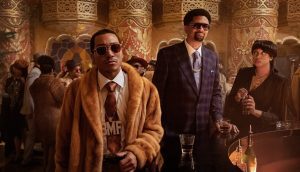An exhibition revealing the secrets of the “Great Dictator” on the 80th anniversary of its founding

Antonio Broto
Corsier-sur-Vevey (Switzerland), March 27th (EFE). – The Swiss country house in which actor and director Charles Chaplin lived “in exile” for the past 25 years, and which today has been converted into a museum in his honor, celebrates the 80th anniversary exhibition of “The Great Dictator”, his most dangerous film, with the message of freedom that is still Resonate.
The exhibition, which opens until August 29 in this museum overlooking the Alps, called the Chaplin Universe, recalls a movie released in October 1940, even before the United States entered World War II, which Chaplin executed amid financial difficulties and pressures. Against you.
Threats of death and fear during filming
“He received death threats during filming (in 1939), and hesitated to release it in case he was in greater danger to the Jews, but even the American president (Franklin D. Roosevelt) encouraged him to finish the film,” he tells Evie. Museum Press Officer Annick Barbizat-Perrin.
Thanks to the previously unpublished photos of Dan James (Chaplin’s personal assistant), the exhibition reveals little-known details of the iconic film, in which the British artist played two characters: an unknown Jewish barber, and Adenoid Hynkel, a version of Adolf Hitler who directed it. Hand of iron nation Tomania.
James’ photos, for example, show scenes filmed but not seen in the movie where Hynkel was riding in a toy balloon, or playing with his wife’s pet in fiction, a monkey, who did not finally appear in the movie, nor the donkey he had to perform. The Nazi salute with its tail.
“Also on display is the original jacket that Chaplin wore when playing Hynkel, which we discovered in a private collection here in Switzerland,” Barbizat-Perrin explains.
The exhibit also illustrates unknown aspects of the photography, such as the fact that the tanks that appear at the end of the film, comically appearing from piles of straw, were actually miniatures, or that Chaplin actually filmed some of the scenes upside down. . The initials in the plane.
Risky teaser movie
The goal, however, is to remember a film that adapts like a few others to the positional expression “ahead of its time”, by demonstrating that it was possible to make the humor of characters as truly sinister as Hitler or Mussolini (he turned in the film to Benzino Napoleon, general of the nation of bacteria ).
“Chaplin was always very proud of this film, which is still very relevant to the political context today,” he said, “because it is a reminder that our freedom is not guaranteed, and that there are still dictatorships in many countries and freedom must be appreciated.” Museum press officer.
The “Great Dictator” also showed that while making jokes, values such as freedom or equality could be demonstrated, although Chaplin himself admitted years later that if the atrocities of the Nazi regime with the Jews had been known, he would have reconsidered whether or not doing the movie.
However, on the other hand, fate appears to “condemn” Chaplin to filming this movie, due to his strange relationship with Hitler: they are both born around the same time (in April 1889, only four days apart) and the two share a distinctive “toothbrush” mustache.
Barbizat-Perrin recalls: “The press at that time often compared the appearance of both, and Chaplin was joking that Hitler stole his mustache to gain sympathy among the people.”
Your first “conversation”
The movie was also significant in Chaplin’s career because it was the first in which he did not play his most famous character, the vagabond Charlotte, as well as the first in which the actor, who had been reluctant to speak for many years, had a real dialogue.
Four years ago, in “Modern Times,” Charlotte spoke for the first and last time in cinema, although he did so by singing a song in an incomprehensible language that Chaplin quickly improvised.
The London-based actor and director, who in many of his films showed his commitment to the most marginalized and a certain rebellion with the established power, left the United States in the early 1950s, after being accused of being a communist in the McCarthyism context, and lived with his huge family in Switzerland until his death in 1977.
On the 80th anniversary of The Great Dictator, Universo Chaplin is also encouraging moviegoers to pay tribute to him by visiting letusallunite.world to share their photos in creating a poster that reproduces the words of the film’s legendary final speech.
At the end of that speech, Chaplin said: “Let us fight for the world of reason, a world in which science and progress lead us to happiness”: words that will continue, after eight decades, to appear strongly in the minds of the viewer. EFE
abc / is / amg
© EFE 2021. The redistribution and redistribution of all or part of the contents of the Efe Services is expressly prohibited, without the prior and express consent of EFE SA.

“Professional problem solver. Subtly charming bacon buff. Gamer. Avid alcohol nerd. Music trailblazer.”




:quality(75)/cloudfront-us-east-1.images.arcpublishing.com/elcomercio/6NEH6FMKYBCU7JJWZ5GVRZKTRM.jpg)
/thumbs.vodgc.net/1-14-FnXFWZ1684253239488_1080P.jpg)





